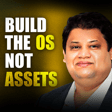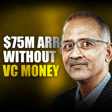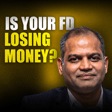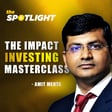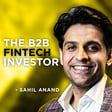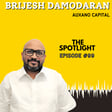
Crypto vs Stocks vs Gold: What Should You Really Invest In? | Raghvendra Nath(Ladderup) Explains
Stop thinking about your wealth like a startup.
Your biggest strength as a founder - your bias for high-risk, high-growth, and breakneck speed - is your biggest liability when managing your own money. The instinct that built your company can easily destroy your personal wealth. This episode is the antidote.
In this episode, host Akshay Datt sits down with Raghvendra Nath, a 30-year veteran of the Indian financial markets. After a stellar 18-year corporate career in senior roles at the Aditya Birla Group, Raghvendra co-founded Ladderup Wealth Management in 2011. He has since grown the firm to manage an AUM of 2,000 Crore by challenging the industry's product-pushing culture. His core philosophy is brutally simple: protect the capital first.
This conversation is a masterclass in building and preserving wealth for entrepreneurs who have created something valuable and can't afford to lose it.
Learn:
👉The math behind compounding that can double your money in 5 years instead of 10.
👉Why Raghvendra believes most day trading is a zero-sum game destined to fail.
👉The surprising truth about gold’s performance and why central banks are buying it furiously.
👉A breakdown of when to use Mutual Funds, Portfolio Management Services (PMS), or Alternative Investment Funds (AIFs).
👉The single biggest mistake investors make when choosing a fund to invest in.
👉The powerful case study of Titan, and how a company’s revenue can become its profit over a decade.
If you're an entrepreneur or leader who has built something valuable, this conversation is non-negotiable.
#FounderThesis #Investing #WealthManagement #StockMarket #FinancialPlanning #Entrepreneurship #StartupIndia #AssetAllocation #Compounding #LongTermInvesting #IndianStartups
Disclaimer: The views expressed are those of the speaker, not necessarily the channel


